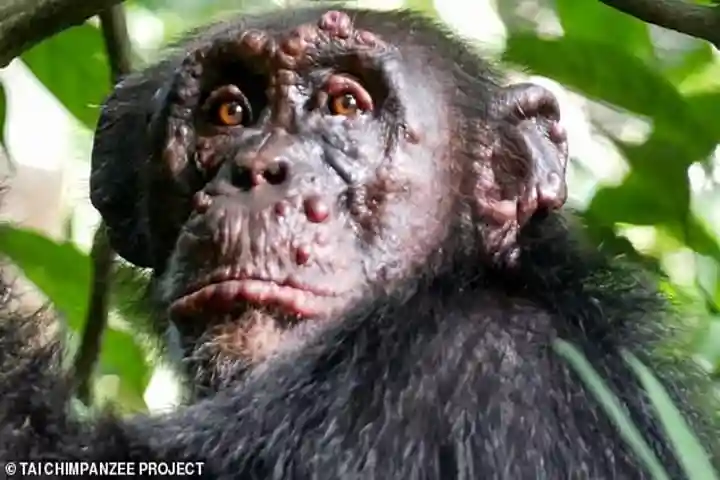

Latest study of chimpanzees in Africa's Guinea-Bissau and Ivory Coast has revealed incidence of leprosy among some of them
<p>
<strong>Leprosy or Hansen&rsquo;s disease is one of those terrible illnesses that not only causes agonising physical trauma but also emotional upheaval in one&rsquo;s life as it leads to ostracization and social stigma. Unfortunately, this disease according to a new study has now been confirmed in wild chimpanzees for the first time.</strong></p>
<p>
The cases of the disease interestingly have been established in two populations of chimpanzees of West Africa, which are unconnected. These are the ones in Guinea-Bissau and the Ivory Coast according to an article in smithsonianmag.com.</p>
<p>
The details of the research and analysis published in the journal Nature reveal that the leprosy strains are different and the two are not found in human beings.</p>
<p>
It is still not clear as to how the infections came into being by the researchers who said that the study points out that leprosy has been circulating among more wild animals than what was earlier thought to be. This they feel could be because of exposure to human beings or environmental reasons which are not known so far.</p>
<p>
<strong>Also read: <a href="https://www.indianarrative.com/science-news/how-orangutan-s-can-communicate-loud-and-clear-despite-thick-forest-cover-and-distance-120158.html">How Orangutan&#39;s can communicate loud and clear despite thick forest cover and distance</a></strong></p>
<p>
The University of Exeter and the Robert Koch Institute led the team of researchers.</p>
<p>
It may be recalled that even though human beings are the primary host for Mycobacterium leprae bacteria &ndash; the cause of leprosy &ndash; its &ldquo;spill-over&rdquo; have been found in other creatures like red squirrels and nine-banded armadillos.</p>
<p>
The study&rsquo;s lead author Dr Kimberley Hockings, of Centre for Ecology and Conservation on Exeter&#39;s Penryn Campus in Cornwall sharing details said: <a href="https://www.sciencedaily.com/releases/2021/10/211013114023.htm">&rdquo;This is the first confirmation of leprosy</a> in nonhuman animals in Africa. It&#39;s amazing that it also happens to be in our closest living relative, the chimpanzee, especially considering how well studied chimpanzees are in the wild.&rdquo;</p>
<p>
Hockings detailing the sequence events added: &quot;We first noticed possible symptoms of leprosy in a population of chimpanzees in Guinea-Bissau. The symptoms appeared to be strikingly similar to those suffered by humans with advanced leprosy, including lesions and &#39;claw&#39; hand. We contacted Professor Fabian Leendertz from the Robert Koch Institute to confirm these cases genetically.&quot;</p>
<p>
Once these findings were shared, Professor Leendertz and Dr Roman Wittig from the Max-Planck-Institute for Evolutionary Anthropology pinned down more such occurrences of the disease in Taio National Park, Ivory Coast, which is the site of their study.</p>
<p>
Further, post-mortem of an older female and adult male faecal samples confirmed leprosy. While this study deals with cases of leprosy in wild chimpanzees for the first time, among the captive ones there have been cases earlier.</p>
<p>
Dr Charlotte Avanzi, from Colorado State University, talking about the study said: &ldquo;The strains identified in each chimpanzee population are different, and both are rare in humans and other animal reservoirs worldwide. This study unlocks a new step toward the understanding of the disease transmission in endemic countries and more investigations will eventually shed light on the dynamic of transmission between human, animal and environmental sources.&quot;</p>
<p>
Hockings shared further details and added: &ldquo;In Guinea-Bissau it is possible that chimpanzees somehow acquired leprosy from humans in this shared landscape, although people do not kill or eat chimpanzees. It is clear that leprosy is now being transmitted between separate chimpanzee communities.&quot;</p>
<p>
<strong>Also read: <a href="https://www.indianarrative.com/science-news/contrary-to-belief-study-suggests-that-male-squids-are-concerned-parents-113933.html">Contrary to belief, study suggests that male squids are concerned parents!</a></strong></p>
<p>
Talking about Ivory Coast cases, Professor Leendertz said: &quot;In the Ivory Coast, chimpanzees are more distant from human settlements and it seems more likely that the chimpanzees acquired the infection from another animal species, or from an environmental source such as ticks or bacteria living in water.&quot;</p>
<p>
While in the case of human beings, leprosy can be treated but it is difficult to know how it will impact the animals.</p>
<p>
Expressing his concern on the disease Hockings pointed out that the &quot;Western chimpanzees are critically endangered, so even the loss of a few individuals could be significant.&rdquo;</p>
<p>
Speaking in the same vein, Wittig said: &quot;Long-term health monitoring and research is needed to establish the scale and possible effects of leprosy among wild western chimpanzees.&rdquo;</p>
<p>
The research team included authors from West Africa, Europe and the USA.</p>
<p>
Given the fact that humanity has suffered so much due to leprosy, it is hoped that people will understand and empathise with the suffering of these helpless creatures.</p>
The Border Security Force (BSF) Director General Daljit Chawdhary on Friday met with Union Home…
By Shailesh Yadav Google Gemini, the generative artificial intelligence tool of technology major Google, can…
Union Home Minister Amit Shah spoke with Chief Ministers on Friday and asked them to…
Raja Abid, Chairman of the Revolutionary Students Organisation, has condemned the deteriorating education system in…
Tibetans-in-exile in Shimla observed the 36th birthday of the 11th Panchen Lama, Gendhun Choekyi Nyima,…
Leaders of the Baloch Yakjehti Committee (BYC), currently held in Huda Jail in Quetta, have…